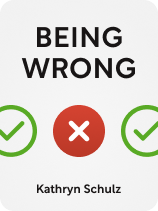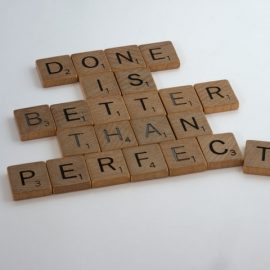

This article is an excerpt from the Shortform book guide to "Being Wrong" by Kathryn Schulz. Shortform has the world's best summaries and analyses of books you should be reading.
Like this article? Sign up for a free trial here.
What does it feel like to be completely wrong about something? What if you’re wrong about a belief that’s central to your identity?
In her book Being Wrong, Kathryn Schulz explores the emotional journey of discovering and coping with our mistakes. She delves into the stages we go through when confronted with error, from denial to acceptance.
Keep reading to discover how embracing uncertainty can lead to personal growth and compassion for others.
What to Do When You’re Wrong
Like everyone else, you hold a lot of beliefs. What if you’re wrong about one of them—or half of them? We’ve all felt the pain of making small mistakes—acknowledging the big ones throws us into turmoil. If you find out you’ve been wrong on a major level, especially about a core belief that part of your worldview hinges upon, it can trigger a full-blown existential crisis. As with grief, there are stages you’ll inevitably go through, including gauging the scope of how wrong you’ve been, denying your error or perhaps defending it, before hopefully accepting that you were wrong and finding a way to grow in response.
Schulz says that, when you learn you’ve been wrong, your first question will be to ask, “By how much?” Determining the scale of how wrong you are determines how many of your beliefs you’ll have to change, and how truthfully you can answer that question depends on how well you can take the emotional punch of admitting your mistakes. Your initial response will also include a measure of denial as a defense mechanism. Short-term denial isn’t necessarily bad. It can give you enough emotional breathing room to face up to your mistake once the initial shock has passed. Long-term denial is a different story. Instead of healthy growth, it’s rooted in deceit—lying to others and lying to yourself.
(Shortform note: While Schulz advocates a somewhat gentle approach to assessing your mistaken beliefs, hedge fund manager Ray Dalio recommends a more stringent form of self-reflection. In Principles, Dalio says that you must pursue the truth of any situation, and that to do so you have to always embrace the possibility that your views are wrong. The first challenge that Dalio draws attention to is overcoming the hurdle of your own ego—instead of assuming that your views are right, you must always ask, “How do I know I’m right?” The next step is to work around your blind spots by staying receptive to ideas that challenge your beliefs, a skill that requires humility and a degree of self-awareness.)

———End of Preview———
Like what you just read? Read the rest of the world's best book summary and analysis of Kathryn Schulz's "Being Wrong" at Shortform.
Here's what you'll find in our full Being Wrong summary:
- Why you shouldn’t try to completely avoid making mistakes
- The reasons why you get things wrong
- How to make mistakes without falling victim to shame and denial






